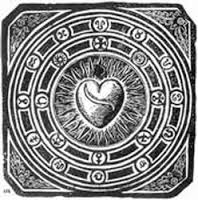Français
Comme Dieu crée les choses en les voyant dans son propre Logos, l’homme apporte la vérité à la vie dans son esprit par le mariage de la lumière divine, dans l’être de l’objet, avec la lumière divine dans sa propre raison. La rencontre de ces deux lumières dans un même esprit est la vérité.
Mais il y a encore une lumière supérieure, pas la lumière par laquelle l’homme “donne des noms” et forme des concepts, avec l’aide de l’intelligence active, mais la lumière sombre dans laquelle aucun nom n’est donné, dans lequel Dieu confronte l’homme non par le moyen des choses, mais dans sa propre simplicité. L’union de la simple lumière de Dieu avec la simple lumière de l’esprit de l’homme, dans l’amour, est contemplation. Les deux simplicités sont une. Ils forment, pour ainsi dire, un vide où il n’y a pas d’addition mais plutôt l’enlèvement de noms, de formes, de contenus, de sujets, d’identités. Dans cette réunion, il n’y a pas tant une fusion d’identités qu’une disparition d’identités. La Bible en parle très simplement: “Dans la brise après midi, Dieu est venu marcher avec Adam au paradis.” C’est après midi, dans la lumière déclinante du jour créé. Dans la vacuité libre de la brise qui souffle d’où elle veut et va où personne ne peut l’estimer, Dieu et l’homme sont ensemble, ne parlant pas en mots, en syllabes ou en formes. Et c’était le sens de la création et du Paradis. Mais il y en avait plus.
Original
As God creates things by seeing them in His own Logos, man brings truth to life in his mind by the marriage of the divine light, in the being of the object, with the divine light in his own reason. The meeting of these two lights in one mind is truth.
But there is a higher light still, not the light by which man “gives names” and forms concepts, with the aid of the active intelligence, but the dark light in which no names are given, in which God confronts man not through the medium of things, but in His own simplicity. The union of the simple light of God with the simple light of man’s spirit, in love, is contemplation. The two simplicities are one. They form, as it were, an emptiness in which there is no addition but rather the taking away of names, of forms, of content, of subject matter, of identities. In this meeting there is not so much a fusion of identities as a disappearance of identities. The Bible speaks of this very simply: “In the breeze after noon God came to walk with Adam in paradise.” It is after noon, in the declining light of created day. In the free emptiness of the breeze that blows from where it pleases and goes where no one can estimate, God and man are together, not speaking in words, or syllables or forms. And that was the meaning of creation and of Paradise. But there was more.
